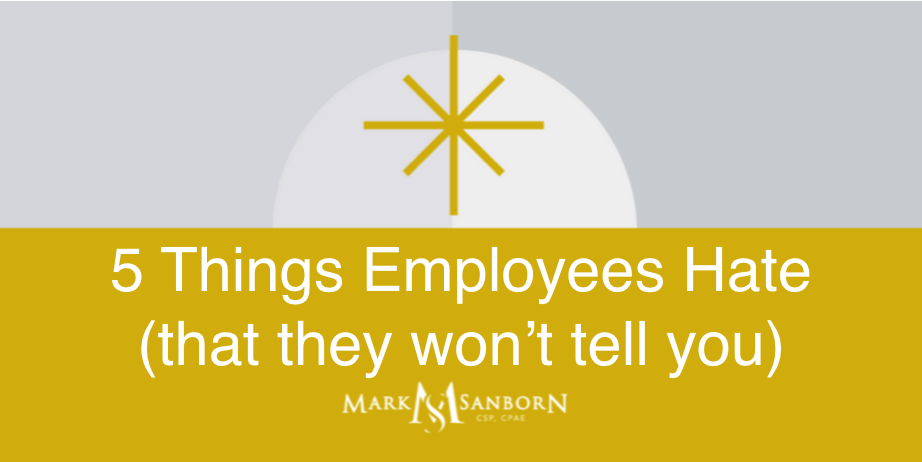Many years ago I worked for a company where the CEO was a stickler for how many hours employees worked. He made it a point to note who came early and who stayed late. He considered anyone who didn’t a slacker.
As a result, all but the bravest came in early and many stayed late. They didn’t necessarily work—they socialized, read magazines, drank coffee and made phone calls—but their presence was noticed and rewarded.
The most damning indictment of this management boondoggle was an assistant who had access to the boss’s schedule. She would secretly inform friends when he was going to be out of town and the result was a severely shortened workday for those who were tipped off.
Instead of rewarding results, he rewarded butt-in-chair time. Instead of focusing on output, he focused on input.
Most hated the practice, but nobody told him.
How many things might your employees be harboring as irritations or worse that you don’t know about? Here are five possibilities:
- “You reward the wrong things.”
Are you in a category similar to the CEO above?
What gets rewarded gets done. It is such a familiar axiom of management that it is nearly cliché. It is, however, completely true. Where you focus your attention focuses your employees’ attention. What you notice, note and reward will get done more frequently.
Identify the results that matter and focus on those things. And don’t be like the executive above who confused activity with accomplishment.
- “You don’t listen.”
Even if an employee told you, you might not really hear him or her. It is too easy to be distracted and pre-occupied. It is a challenge that many of us face.
The quickest way to become a better listener is easy: when an employee is in your workspace to talk, turn off your email alerts, close your door and let your monitor go into sleep mode. Give your undivided attention to the person in front of you. They will feel you value them, and you’ll likely increase the quality and speed of the interaction.
- “You don’t notice what I do.”
Brittney was a financial manager at a client firm. She was bubbly and outgoing. She also had the ability to draw attention to her “contributions,” though many weren’t that significant.
Employees hated her self-aggrandizement. But they also disliked that management noted Brittney’s efforts because they were easily observed. Leaders didn’t pay attention to the good and often better work others were doing.
Great work is often done backstage, out of the spotlight. The glitter of self-promotion doesn’t blind great entrepreneurs. They seek out those people doing good work and make it a point to notice.
Pay attention to people who do good work and let them know. Don’t get suckered by people who are better at promoting themselves than producing results.
- “Your attitude sucks.”
Attitudes are contagious. Mirror neurons pick up on the moods of those around us and affect us. Leaders are especially powerful in influencing the mood of those on the team.
Bill is an entrepreneur who constantly complains about how terrible his employees are at delivering customer service. He berates and belittles even their best efforts. And yet he’s puzzled why those same employees treat customers poorly. The irony escapes him.
Don’t expect others to be more upbeat than you, or treat customers better than you treat them. There are a few entrepreneurs who might have dodged this bullet, but not enough to be statistically significant. Your attitude is contagious so pay attention to how you show up at work each day.
- “I don’t trust you.”
If people don’t trust you, they will follow, but out of compliance instead of commitment.
A young entrepreneur we will call Bob loved to share inside information about others. At one after work beer session he shared something that a coworker not in the group had shared confidentially (or so she thought). It was less than flattering and was instantly off-putting to those in the group.
The employee—a valued and productive member of the team—was outraged and left the company soon after.
Don’t think that trust can be effectively compartmentalized. If you’re known to be untrustworthy in your personal dealings, likely few will trust you in your professional dealings.
Nobody is a mind reader. If you want to find out other things that your team might hate but be unwilling to share, work on building trust and being open equally to good news and bad news. Then ask them what they really think.
Consider what you might be doing that your employees hate but that they’re not telling you. Despite our familiarity with the cliche that nobody is perfect, we’d all like to think we are pretty darn good. It takes moral bravery to identify and confront your weaknesses, but that is exactly what you need to do if you want to be a better leader.
Mark Sanborn is a leadership keynote speaker and advisor to leaders based in Denver, CO.








